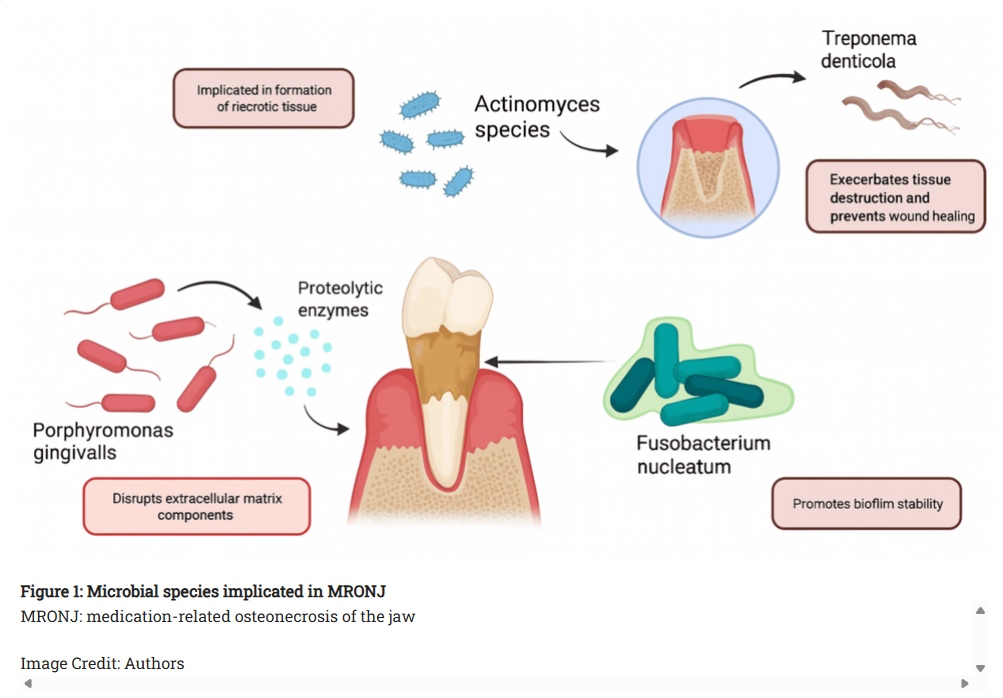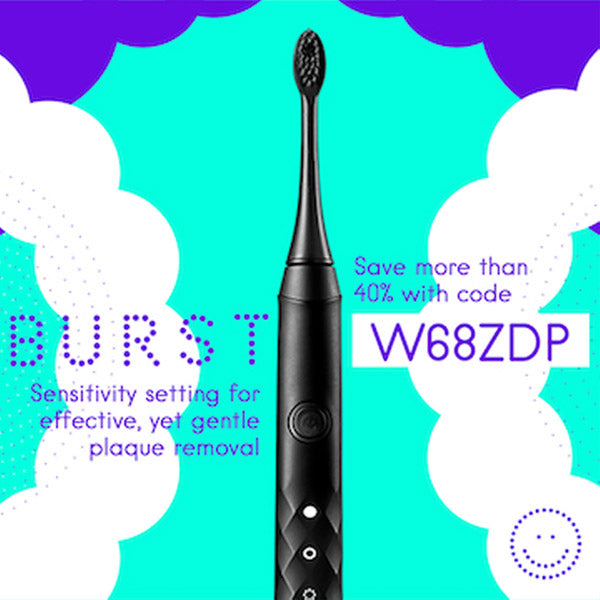Potential Role of Oral Microbiota in Medication-Related Osteonecrosis of the Jaw in Cancer Patients: A Narrative Review

Al Harrasi R J, Al Balushi A Y, Al Kindi F I, et al. (August 12, 2025) Potential Role of Oral Microbiota in Medication-Related Osteonecrosis of the Jaw in Cancer Patients: A Narrative Review. Cureus 17(8): e89943. doi:10.7759/cureus.89943
Abstract
Medication-related osteonecrosis of the jaw (MRONJ) is a severe complication frequently observed in cancer patients undergoing antiresorptive therapies, such as bisphosphonates and denosumab. Emerging evidence suggests that dysbiosis of the oral microbiota plays a pivotal role in the pathogenesis of MRONJ. The complex interplay between microbial communities, host immune responses, and the effects of cancer treatments creates an environment conducive to pathogenic colonization, chronic inflammation, and impaired bone healing, which are the key hallmarks of MRONJ. Chemotherapy, radiotherapy, and antiresorptive agents significantly disrupt oral microbiota homeostasis, reducing microbial diversity and the overgrowth of opportunistic pathogens. These alterations exacerbate the inflammatory responses, accelerate bone resorption, and impede tissue repair. The identification of specific microbial biomarkers associated with MRONJ could facilitate early detection and targeted interventions, such as antimicrobial and probiotic therapies, to restore the microbial balance and mitigate the risk of MRONJ. Furthermore, the implementation of personalized preventive protocols, including rigorous oral hygiene and multidisciplinary collaboration among oncologists, dentists, and microbiologists, is critical for reducing the incidence and severity of MRONJ in high-risk populations. Future research should focus on elucidating the mechanisms by which microbial dysbiosis contributes to MRONJ, validating microbiome-based diagnostic tools, and optimizing therapeutic strategies to preserve oral and systemic health in patients with cancer. Integrating microbial ecology into the MRONJ management framework offers a promising avenue for addressing this challenging condition and improving the outcomes for vulnerable individuals.
Introduction & Background
Medication-related osteonecrosis of the jaw (MRONJ) is a serious complication primarily affecting cancer patients receiving antiresorptive therapies such as bisphosphonates or denosumab. Both are widely prescribed to manage bone metastases and osteoporosis, a common outcome of cancer and its treatment, contributing to improved patient outcomes [1]. However, their use is associated with a risk of MRONJ, a debilitating condition marked by persistent jawbone exposure, delayed healing, and substantial functional and aesthetic consequences [1,2]. Given its clinical burden, the prevention and management of MRONJ requires close interdisciplinary collaboration between oncologists and dental professionals [3].
Emerging evidence indicates that oral microbiota alterations are most likely to play a crucial role in MRONJ pathogenesis. The oral cavity harbors a dynamic and complex microbial community that plays a vital role in oral and systemic health. Dysbiosis refers to a significant imbalance in the oral microbiome, where beneficial bacteria are outnumbered by pathogenic microorganisms, potentially leading to adverse health conditions like MRONJ. Dysbiosis has been implicated in inflammatory conditions such as periodontitis and peri-implantitis, which share pathological features with MRONJ, including chronic inflammation and impaired tissue regeneration [4]. This overlap raises a basic question: could some alterations in the oral microbiome influence the initiation or progression of MRONJ?
Moreover, cancer treatments such as chemotherapy and radiotherapy can significantly alter the oral microbial environment, promoting opportunistic infections and pathogenic biofilm formation [5]. These disturbances may exacerbate local immune dysfunction and interact with antiresorptive agents, collectively increasing the risk of MRONJ. Identifying microbial biomarkers associated with MRONJ could therefore aid in early detection, risk stratification, and the development of microbiome-targeted interventions.
This narrative review aims to explore the role of oral microbial dysbiosis in the development and progression of MRONJ. Specifically, it examines how cancer therapies, particularly antiresorptive agents, chemotherapy, and radiotherapy, disrupt oral microbiota balance, contributing to inflammation, bone necrosis, and impaired healing. The review also discusses the potential of microbial biomarkers in guiding early diagnosis and preventive strategies to improve outcomes for at-risk patients.
Literature search strategy
This narrative review was conducted by searching major electronic databases, including PubMed, Scopus, and Google Scholar, to identify relevant studies on the role of oral microbiota in MRONJ among cancer patients. Keywords and MeSH terms used in various combinations included: "MRONJ", "oral microbiota", "microbiome", "cancer", "bisphosphonates", "denosumab", and "osteonecrosis". The inclusion period covered studies published from 2002 to 2025, with a focus on peer-reviewed original articles, reviews, and clinical or experimental studies. Reference lists of selected articles were also screened to identify additional relevant literature. Articles were selected based on their scientific relevance, methodological quality, and contribution to understanding the interaction between the oral microbiome and MRONJ pathogenesis in oncology patients.




